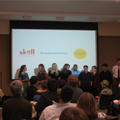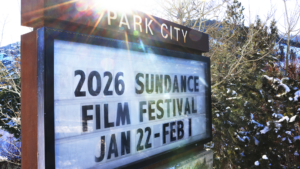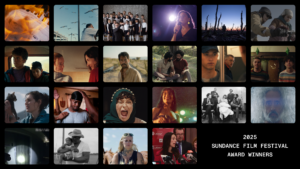Jon Korn
“This is the sound of the world changing,” observed a grinning Cara Mertes, Director of Sundance Institute’s Documentary Film Program and Fund, as she took the stage amid deafening applause. The audience in front of her had gathered for the first ever Stories of Change Impact Lab, where teams of innovators and artists had spent the better part of the past week huddled together at the intersection of documentary storytelling, new media and social justice.
To say the crowd was diverse would be a wild understatement. Storytellers and technologists, designers and social entrepreneurs, strategists and programmers had come together in Berkeley, CA for this unprecedented new initiative from the Skoll Foundation and the Sundance Institute, designed to offer a forum for social entrepreneurs, innovators, and artists to find the areas where their work intersects and to devise strategies to expand the impact and reach of their work through more effective use of traditional and trans-media storytelling.
Mertes had kicked off the proceedings by tracing the origins of the Impact Lab, an outgrowth of the Stories of Change Partnership, which has been connecting filmmakers and social entrepreneurs since its founding in 2007. With 10 feature-length documentaries in production, Mertes explained, both Sundance Institute and Skoll felt they had reached a pivotal point in the life of these projects and the ever-evolving new media tools available to storytellers of all stripes. “This Lab is an expression of the evolution of this partnership,” revealed Mertes, “to a newer, riskier, and ultimately more impactful endeavor.”
The vital connection between story and change was a recurring theme throughout the course of the Impact Lab. “Storytelling is core to Skoll’s view of the world,” agreed Skoll Foundation’s Director of Strategic Alliances, Sandy Herz. “Our belief is that we can accelerate the impact of social entrepreneurs around the world.”That sentiment provided the foundation for the Lab’s goals, which was to identify the biggest challenges facing each organization and design a strategy to address those issues. “We hope that this is going to be an interesting recipe, ” laughed Gabi Brink, Founder and Executive Creative Director of Tomorrow Partners. “A wonderful combination that will lead to truly great ideas.”
To facilitate this process, Skoll and Sundance Institute turned to Tomorrow Partners , a Berkeley-based strategic design agency, which spent three months devising and organizing a week-long lab that matched five established social change-makers with teams of storytellers, designers and advisers. The underlying hope behind this approach was that the results of these collaborations between these highly accomplished and effective individuals would ultimately equal more than the sum of their parts.
Among the most innovative aspects of the Lab is the design-centered approach and the extensive design and storytelling expertise each team had at its disposal. The five Skoll Foundation-supported social entrepreneur organizations participating in the Lab attended with filmmakers whose most recent projects have been funded by the Stories of Change partnership between the Skoll Foundation and Sundance Institute. The teams were engineered to showcase a diversity of unique perspectives on how to effectively convey a message that has the potential to become a catalyst for change. The Lab’s participants also represent the wide range of social entrepreneurs involved in Stories of Change:
Barefoot College aims to make rural communities self-sufficient and sustainable. The organization’s recent work includes a program that has taught over 700 mothers and grandmothers from all over the world to be solar engineers. Filmmaker Mona Eldaief, who has worked on such documentaries as Control Room, A Wedding in Ramallah, and Her Name is Zelda, is currently working on a documentary about the solar training program.
Imazon promotes sustainable development in the Amazon through research and policy. In 21 years, the organization has developed a revolutionary method of tracking deforestation while publishing hundreds of papers and books.
Throughout the Lab, members of Sundance Institute Documentary Film Program Staff helped the team integrate storytelling into their proposal.
mothers2mothers works to eradicate mother-to-child HIV transmission. The group employs mothers living with HIV as ‘Mother Mentors,’ who work to prevent new infections among infants while keeping both babies and their mothers alive. Dr. Neal Baer, who has executive produced such television hits as ER, Law & Order: Special Victims Unit, and A Gifted Man, joined the team as an advisor.
Partners In Health provides preferential health care options for the poor. Since 1987, the organization has grown to include 11,000 employees, working in 49 health centers and hospitals across 11 countries. Producer Cori Shephard Stern, whose has worked in both the film industry and as a social change strategist, is working on a documentary about PIH.
YouthBuild USA marshals the positive energy of low-income youth to rebuild their communities and their lives. Over the past 30 years, the program has grown to include 46 states and produced 300,000 graduates. Producer Brooke Brewer represented Break Thru Films, which is working on a film about YouthBuild and has made numerous documentaries including Burma Soldier, Joan Rivers – A Piece of Work and The Devil Came on Horseback.
Just five days after that initial meeting, the participants reunited as a group to share the results of their collaborations. As each team prepared for their fifteen-minute presentation, the room was abuzz with nervous energy and limitless possibility. All of the social entrepreneurs present worked for organizations that had succeeded in doing the impossible: producing lasting and tangible change in some of the most difficult settings around the world. But they had never done anything like this.
First mothers2mothers unveiled its plans for an ‘ambassador’s toolkit’ that would allow the organization to raise the funds and awareness necessary to end Pediatric AIDS by 2015. Then Imazon explained how a redesign of its website – the primary vehicle through which its research is disseminated – might increase the efficacy and reach of the organization’s work.
Partners In Health dedicated the week to designing a new means of online fundraising raising money. One potential solution to emerge from the Lab’s brainstorming sessions was subscription-based initiative intended to fund a comprehensive plan to treat non-communicable diseases. Meanwhile, the Barefoot College team had created a program to equip every graduate of its program with a tablet that would offer continued training, a means of communication, and a tool to measure impact.
The Lab clearly had an impact on Jackie Gelb, YouthBuild USA’s Growth Planning Senior Advisor. “It was spectacular,” she exclaimed. “It was a revolutionary process.” Her organization used the week to tackle their status as “the most successful organization that you’ve never heard of.'” The plan they developed was to start collecting success stories from YouthBuild USA’s hundreds of thousands of graduates, and then share them online.
“We’ve always known we wanted to do this, but we had no idea how to create that pathway forward, “said Gelb. “The people we were working with had skills that were outside of our normal reach as a non-profit.”




